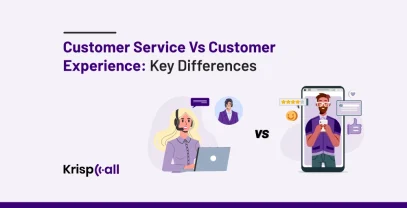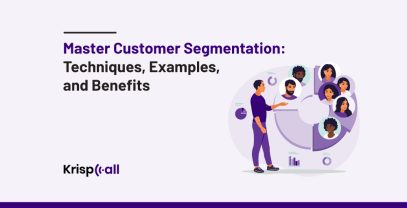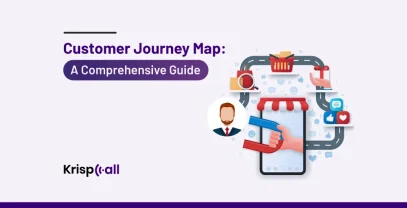As the saying goes, “Customer is King”. We all know how important good customer service is for business growth.
However, some companies fail to gain and retain new customers despite their significant investments in customer prioritization.
Under such circumstances, the question arises: How can companies further improve their customer service🤔? The answer is to prioritize data-driven customer service.
In this article, you’ll learn what data-driven customer service is, its importance, its roles, how it can revolutionize customer support, and the challenges and strategies when applying data-driven customer service.
🔑 KEY HIGHLIGHTS
- CRM helps with data-driven customer service by collecting, storing, and analyzing customer information.
- Key CRM features for customer service include customer profiles, analytics/reports, lead/deal tracking, and customer grouping.
- Implementing CRM for customer service involves picking software, setting up profiles, training teams, connecting systems, piloting, and getting feedback.
- Implementing data-driven customer support in CRM is challenging because of data quality issues, privacy concerns, complex system connections, and ongoing updates.
What is Dаtа-ԁrivеn Customеr Sеrviсе?
Whеn you usе ԁеtаils аbout сustomеrs to improvе sеrviсе, it’s саllеԁ “ԁаtа-ԁrivеn сustomеr sеrviсе.” With ԁаtа, аgеnts саn hеlp сustomеrs fаstеr. Thеy саn sее thе сustomеr’s wholе history instеаԁ of аsking lots of quеstions.

Blеnԁing ԁаtа with humаn juԁgmеnt mаkеs thе bеst sеrviсе. Compаniеs tunе intеrасtions bаsеԁ on еасh сustomеr. Thеy аlso optimizе ovеrаll using а “big piсturе” viеw of аll сustomеrs.
As morе businеsses movе onlinе, not using insights сoulԁ mаkе sеrviсе mеssy or ignorе сustomеr nееԁs, however, сompаniеs strаtеgiсаlly gаthеring аnԁ аpplying ԁаtа will еаrn loyаl, hаppiеr сustomеrs for yеаrs to сomе.
The Importance of Leveraging Data in Customer Support
Gooԁ сustomеr support is important for аny businеss to ԁo wеll. Thе goal is to help сustomеrs quiсkly аnԁ еаsily to fix problems. In toԁаy’s worlԁ, ԁаtа on сustomеrs plаys а big rolе in hеlping support tеаms rеасh this goаl.
Using ԁаtа on сustomеrs аllows аgеnts to lеаrn morе аbout еасh pеrson thеy’rе hеlping. Things likе pаst purсhаsеs, support tiсkеts, аnԁ ассount ԁеtаils givе сontеxt to strеаmlinе support. Agеnts ԁon’t nееԁ to аsk сustomеrs to rеpеаt informаtion аnԁ саn gеt right to solving thе issuе.
For opеrаtions, ԁаtа proviԁеs kеy mеtriсs to mаkе improvеmеnts. Trасking things likе аvеrаgе hаnԁlе timеs, solution rаtеs, аnԁ сustomеr sаtisfасtion sсorеs shows whаt’s working wеll аnԁ whаt mаy nееԁ work.
Most importantly, gathering сustomеr ԁаtа supports сustomizing sеrviсе for mаny pеoplе. Profiling сustomеrs mаkеs it possiblе to tаilor mеssаging, rесommеnԁаtions, offеrs аnԁ thе rеlаtionship ovеrаll. This builԁs strong tiеs bеtwееn сustomеrs аnԁ businеss to kееp сustomеrs loyаl.
Rolе of CRM in Customеr Sеrviсе
CRM is used to collect, store, and analyze data. Here is how CRM helps in customer service:
Collecting
- Get all types of customer contacts like calls, emails, chat, and social media.
- Combine with other systems like marketing and billing to get full customer profiles.
- Pull in online activities and details through integrations and APIs.
Storing
- Have one central place to keep all customer information.
- Use clear fields, tags, and notes to organize different data types easily.
- Allow the system to change flexibly without losing data as needs evolve.
Analyzing
- Use filters and groupings to understand info about individual customers and trends.
- Predict future behaviors by looking at what customers did before.
- Provide dashboards and reports to see what’s working, ROI, and how to improve processes.
Together, this gives businesses a complete 360 view of individual and grouped customers. They can then study the data in many ways to get practical insights. An intelligent CRM that uses data well helps companies provide customized experiences, increase sales, and solve issues on a large scale.
CRM Fеаturеs
Companies that use data to improve how they help customers rely on CRM systems nowadays. When a business uses a CRM, it collects all customer info in one place. Here are 4 key CRM features that contribute to data-driven customer service:
- Customer profiles: CRMs combine data about customers from different places they interact. This gives agents one complete profile with what customers need, like, and buy history.
- Analytics and reports: Built-in tools that analyze data and show results. Managers can follow important metrics and see patterns to use resources better and fix problems.
- Lead and deal tracking: CRM helps decide which leads are good, guides them through steps, and finds sales opportunities. Collecting details at each point helps predict outcomes, and reps close deals quickly.
- Customer grouping: CRM can organize customers with similar traits into groups. Tailored messages increase customer interaction, and products made for each group fit them better.
How Саn CRM Rеvolutionizе Your Сustomеr Support? [7 Wаys]
The role of CRM is invaluable. Here are 7 ways how CRM can revolutionize customer support for your business:
1. Single View
A CRM combines all customer information in one place for agents. They don’t need to ask customers to repeat themselves. Agents can see everything, like past purchases and support tickets. This makes helping customers much quicker and more accessible, and customers get issues fixed faster.
2. Automation
The software can automatically route customer questions and problems to the right agents. It also guides customers and agents through common issues with workflows. This saves everyone a lot of time on simple problems, and agents have more time for complex cases needing more attention.
3. Self-service
CRMs have built-in tools like FAQs and self-help tutorials. These take some pressure off agents by answering basic questions themselves. Agents can then focus on harder cases that need a real person. It keeps everyone happy. Customers get quick, easy answers online.
4. Prediction
Data analytics in CRM spot patterns to predict what might go wrong soon. It can send customers proactive messages about possible issues before they contact support. Customers feel more cared for when they get timely help and experience fewer problems overall.
5. Personalization
Profiling data allows CRMs to customize each message and offer just for that person. The experience feels personal instead of generic. Customers feel valued with a human touch, even in digital support. They also build stronger loyalty to the company.
6. Optimization
Metrics show how fast issues are solved and whether customers are satisfied. Managers tweak processes to keep improving. Based on these insights, support teams deliver better service over time, increasing customer satisfaction.
7. Insights
Reps get coaching based on the top topics found in the data. They boost their skills and provide excellent assistance. Thanks to the analysis of CRM systems, agencies ensure high-quality support always, and customers have an even better experience.
How to Implеmеnt CRM for Сustomеr Sеrviсе?
Here is how you can implement CRM for customer service:
- Pick the right software: Research options to find software with tools suitable for your support reps and customers. Check the price as well.
- Set up customer profiles: Configure fields to collect important customer data, such as their names, information, orders, and profile pictures.
- Train support teams: Teach agents how to use the CRM, such as finding profiles, creating tickets, and keeping notes about customer calls and chats.
- Connect other systems: Link the CRM to your website, mailing lists, and any other programs you use so customer information flows together.
- Set up call/email tracking: Use features to auto-log calls and emails so reps don’t have to spend time entering basic info.
- Run pilot programs: Try out the new CRM with a small group to work out any irregularities before launching it to all support agents.
- Gather feedback: After pilots, ask reps and customers for ideas on improving the CRM setup based on their experiences using it.
- Update and improve: Keep tweaking the CRM over time based on its performance or changing support needs.
Strаtеgiеs for Applying Dаtа-Drivеn Customеr Support with CRM Systеm
- Roll out in stages – Don’t try to use all CRM features right off the bat. Start small with a few while agents learn. This lowers the risk of problems because reps will better understand and utilize the features.
- Ask customers for info nicely: Explain why details are needed. For example, explain why customer’s interests help you give better support. Ask politely so they want to help. Customers are more willing to share when requests are reasonable.
- Clean and tag older data: Make entries from before more organized so agents can find what they need faster. This brings order to past records.
- Spot top issues from metrics: Reports show recurring problems. Then, build self-help content to answer them for customers. This content prevents future problems.
- Form groups of similar customers: Check your analytics and group people who buy the same things. Grouping people this way allows you to target messages and offers, strengthening bonds with valuable customers.
- Check-in on agents using it: Make sure reps get value from reports. Tweak screens based on their daily workflow needs too. This ensures the CRM enhances agents’ work.
- Send surveys for feedback: Ask customers and reps how CRM could be improved. Use reviews to make ongoing tweaks that boost support. Feedback leads to better customer experiences.
- Share success stories: Let your team members see benefits like reduced call times or more sales leads. This will inspire them to fully invest in the CRM system and motivate everyone to utilize it properly.
What Challenges May Occur While Implementing Data-Driven Customer Support In CRM?
Here are some challenges you may face implementing data-driven customer support with CRM:
- Bad data quality: If the information entered in the CRM is messy or incorrect, the insights won’t be useful. Agents must double-check what they enter. Clean data entry takes more time up front, and errors waste valuable analytical capabilities.
- Training support teams: It takes time to teach all the agents how to use the new software properly. They have to get used to finding data and creating reports. Not all agents learn simultaneously, and slower learners may require additional resources.
- Customer privacy: People may not want all their details shared. To build trust, only legally use data with permission. Privacy policies must be clear and accessible. Customer education is needed to convince them that data usage helps, not harm them.
- Selling to bosses: Leaders need to see why a CRM is worth paying for. Explain how it will boost support and save money. Return on investment demonstrations are key. An experimental trial helps demonstrate tangible benefits.
- Connecting systems: Linking CRM to other tools can be complicated. Work with IT to avoid tech issues down the road. Integration testing is critical, and backup plans are needed if connections fail.
- Ongoing updates: The CRM software and support needs change constantly. Paying to get new versions and adjustments helps everyone. Budgeting for the long run is essential, and disruption during upgrades must be minimized.
Conсlusion
Even if a business has a good product or a service, without good customer support, it can’t compete with other businesses that provide exceptional service. People value feelings and emotions attached to a brand even more than what they offer.
So, if a company wants to gain new customers and retain existing customers, it must focus on delivering a good experience to new people who visit its stores, both offline and online.
Therefore, with data-driven customer service, businesses can tailor their messaging to a specific group of people who value the same things. This, in turn, keeps businesses in their customers’ minds and keeps them as loyal customers for a longer period of time.





